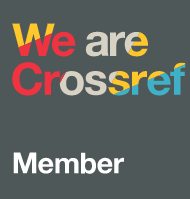Influential Factors On The Political Orientation Of Young Female Voters
Abstract
Keywords
Full Text:
PDFReferences
Almond, G. A., & Verba, S. (1963). The Civic Culture: Political Attitudes and Democracy in Five Nations. Princeton University Press.
Bayu, D. J. (2019). Pemilih Perempuan Lebih Banyak Dibanding Pria di Pilpres 2019. https://katadata.co.id/yuliawati/berita/5e9a55d5e6998/pemilih-perempuan-lebih-banyak-dibanding-pria-di-pilpres-2019
Dimitrova, D. V., & Bystrom, D. (2013). The Effects of Social Media on Political Participation and Candidate Image Evaluations in the 2012 Iowa Caucuses. American Behavioral Scientist, 57(11), 1568–1583. https://doi.org/10.1177/0002764213489011
Fardischa, A. (2020). PENGARUH TONTONAN BERBAHASA INGGRIS DALAM MEDIA SOSIAL YOUTUBE PADA PEMEROLEHAN BAHASA KEDUA ANAK UMUR TUJUH TAHUN. JURNAL PENA INDONESIA Jurnal: Bahasa Indonesia, Sastra, Dan Pengajarannya, 6(1), 51–61. https://online210.psych.wisc.edu/wp-content/uploads/PSY-210_Unit_Materials/PSY-210_Unit01_Materials/Frost_Blog_2020.pdf%0Ahttps://www.economist.com/special-report/2020/02/06/china-is-making-substantial-investment-in-ports-and-pipelines-worldwide%0Ahttp://
Heger, K., & Hoffmann, C. P. (2021). Feminism! What Is It Good For? The Role of Feminism and Political Self-Efficacy in Women’s Online Political Participation. Social Science Computer Review, 39(2), 226–244. https://doi.org/10.1177/0894439319865909
Henseler, J., Ringle, C. M., & Sarstedt, M. (2014). A new criterion for assessing discriminant validity in variance-based structural equation modeling. Journal of the Academy of Marketing Science, 43(1), 115–135. https://doi.org/10.1007/s11747-014-0403-8
Hessami, Z., & da Fonseca, M. L. (2020). Female political representation and substantive effects on policies: A literature review. European Journal of Political Economy, 63(March), 101896. https://doi.org/10.1016/j.ejpoleco.2020.101896
Hobbs, T. (2017). Shock General Election result shows the importance of authenticity and youth targeting. https://www.marketingweek.com/general-election-aftermath-labour-conservatives-corbyn/
Hultman, M., Ulusoy, S., & Oghazi, P. (2019). Drivers and outcomes of political candidate image creation: The role of social media marketing. Psychology and Marketing, 36(12), 1226–1236. https://doi.org/10.1002/mar.21271
Ida Wiendijarti. (2008). Pengaruh Kredibilats Narasumber Berita Politik Terhadap Internalisasi Nilai Berita Politik Pada Masyarakat. Jurnal Ilmu Komunikasi, 6, 33–41.
Khan, A., Muhammad Sohu, J., Ali Sohu, S., Ahmed Dakhan, S., Mustafa, S., & Corresponding Author, P. (2021). Factors Influencing Political Orientation: Mediating Role of Women Empowerment. International Journal of Management (IJM), 12(1), 786–795. https://doi.org/10.34218/IJM.12.1.2021.069
Kristin Anjellina, N., Budhi, S., Jamaluddin, J., Tenri Sompa, A., & Suryadi, B. (2021). Political Orientation Of Dayak Siang Society In The Election Of A Head Of Sub-District In Saripoi Sub-District Murung Raya, Central Kalimantan. International Journal of Politic, Public Policy and Environmental Issues, 1(01), 45–55. https://doi.org/10.53622/ij3pei.v1i01.13
Kurniawati, M. (2023). Pengaruh Keluarga, Tokoh Agama dan Teman terhadap Perilaku Memilih para Pemilih Pemula (The Influence of Family, Religious Leaders and Friends on Voting Behavior of New Voters). Ilmiah Psikologi Mind Set Khusus TIN, 2(1), 106–111.
Mandel, K. C. (2013). Concept and types of women empowerment. International Forum of Teaching and Studies, 9(2), 17–30. http://www.joe.org/joe/1999october/comm1.php
Naufal, A. (2021). Pemilu 2024 Didominasi Pemilih Muda, Apakah Peta Politik Akan Berubah? https://www.kompas.com/tren/read/2022/09/27/143000565/pemilu-2024-didominasi-pemilih-muda-apakah-peta-politik-akan-berubah-?page=all
Neuman, L. (2014). Social Research Methods; Qualitative and Quantitative Approaches Seventh Edition. In Pearson. Pearson Education. https://doi.org/10.2307/3211488
Peng, Y. (2021). What Makes Politicians’ Instagram Posts Popular? Analyzing Social Media Strategies of Candidates and Office Holders with Computer Vision. International Journal of Press/Politics, 26(1), 143–166. https://doi.org/10.1177/1940161220964769
Rasyidin, Muzaffarsyah, T., Zulhilmi, & Rahman, B. (2022). Political Orientation in the Spreading of the New Autonomous Region in the Regency of Aceh Utara. Proceedings of the 2nd International Conference on Social Science, Political Science, and Humanities (ICoSPOLHUM 2021), 648(ICoSPOLHUM 2021), 246–253. https://doi.org/10.2991/assehr.k.220302.036
Saputro, A. (2018). Agama Dan Negara : Politik Identitas Menuju Pilpres 2019. Asketik, 2(2), 111–120. https://doi.org/10.30762/ask.v2i2.912
Shaheen, F., Ahmad, N., Waqas, M., Waheed, A., & Farooq, O. (2017). Structural Equation Modeling (SEM) in Social Sciences & Medical Research: A Guide for Improved Analysis. In International Journal of Academic Research in Business and Social Sciences (Vol. 7, Issue 5). https://doi.org/10.6007/ijarbss/v7-i5/2882
Srinivasa Murthy A T. (2017). Women Empowerment: Issues and Challenges. International Journal of Indian Psychology, 4(2). https://doi.org/10.25215/0402.092
Steffan, D. (2020). Visual Self-Presentation Strategies of Political Candidates on Social Media Platforms: A Comparative Study. International Journal of Communication, 14, 3096–3118. https://doi.org/10.5771/9783748925415-76
Supriyadi, A. (2019). Orientasi Politik Pemilih Pemula Mahasiswa Unisri Dalam Pemilukada Jawa Tengah 2018. Research Fair Unisri, 3(1). http://www.ejurnal.unisri.ac.id/index.php/rsfu/article/view/2590
Tariq, R., Zolkepli, I. A., & Ahmad, M. (2022). Political Participation of Young Voters: Tracing Direct and Indirect Effects of Social Media and Political Orientations. Social Sciences, 11(2). https://doi.org/10.3390/socsci11020081
Thadi, R. (2014). Citra Perempuan dalam Media. Syi’ar, 14(1), 27–38.
Tsichla, E., Lappas, G., Triantafillidou, A., & Kleftodimos, A. (2023). Gender differences in politicians’ Facebook campaigns: Campaign practices, campaign issues and voter engagement. New Media and Society, 25(11), 2918–2938. https://doi.org/10.1177/14614448211036405
Yunita, R. P., & Stanislaus, S. (2014). Orientasi Politik Pemilih pada Pemilu Legislatif tahun 2014. Journal of Social and Industrial Psychology, 3(1), 69–76. https://www.ejurnal.ubk.ac.id/index.php/communitarian/article/view/147
DOI: https://doi.org/10.33373/jtp.v9i1.6934
Refbacks
- There are currently no refbacks.
Office:
Department of Government Studies, Faculty of Social and Political Sciences, Universitas Riau Kepulauan
unit E
Jl. Pahlawan No. 99, Bukit Tempayan, Batu Aji, Kota Batam
Contact: (0778) 39275
e-mail: jurnaltriaspolitika2017@gmail.com
________________________________________________________________________________________________________________________________
In Cooperation with: Powered By:
Jurnal Trias Politika (JTP) is licensed under a Lisensi Creative Commons Atribusi 4.0 Internasional.






.png)



